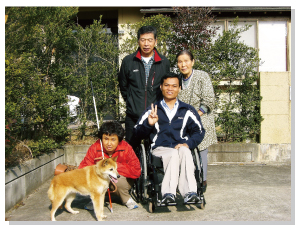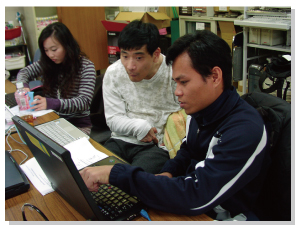- HOME
- Alumni News
- Samith Mey (8th trainee)
- Samith's Final Report
Samith's Final Report
Final Training Report
Coming to Japan:
On September 1st 2006, the first day I arrived in Japan, I was very surprised to see tall buildings and how barrier-free it was for PWDs. After that, I met other trainees and the staff for the first time. At first, I was very shy and nervous, but as I talked with my friends from different countries I felt very happy and excited because this was the first time that I met many people from different countries.
What I learnt
Japanese language training and Swimming
We spent the first three months learning the Japanese language everyday. During the first month our daily conversation was in English but soon we started talking in Japanese and English. It was often confusing and difficult to listen to and understand what everyone was saying, but by using the mixed language everyday, it became easier for us to understand each other. After three months, we could communicate solely in Japanese language and I was able to speak and write Japanese katakana and hiragana. The teacher also taught us some kanji during the class, so I could read some easy kanji. I was very impressed with Japanese teachers’ methods. The class was very fun because we were from different countries and we could share our cultures or talk about each country’s situation. It was a happy surprise when I passed the Japanese Language Proficiency Test.
During these three months, we also enjoyed swimming every Thursday. For the first time in my life, I went swimming; I went to the pool and swam with other people. Thanks to the teachers, I learnt how to breathe properly in the water and learnt some swimming techniques. Now I am able to swim 100 meters in the pool, so I am very happy and when I return to my country I will continue to swim. By the way, in Cambodia, I was shy to join any swimming class, the reason being discrimination on persons with disabilities and having no barrier-free access to the pool.
Group Training
During the group training, I learnt about the peer counselling concept, and visited many places.
The group training was a lot of fun; I enjoyed having discussions and exchanging ideas.
It covered many subjects but I would like to write about the 3 major ones.
Leadership Training
Mr. Yoshinori Ikezumi is a famous facilitator who has a lot of experience of working in many Asian countries. I was very impressed with him when he taught us what disability is, and what leadership means. At that time I didn’t know anything about the word of disability, let alone the meaning of disability.
He also taught us how to make action plans. His unique experience methods were new for me and drew all other participants’ attention throughout the workshop.
I learnt so much from him and understood so much more about the concept of disability and many types of education and leadership.
Project proposal Training
Mr. Hideto Kawakita is famous for having a lot of experience on project proposal writing. After his instructions, the six of us were able to write project proposals, make presentations, and exchange comments on others’ plans with guidance from him.
I was very impressed with him, I learnt so much from him.
Presentation training
I learnt many interesting presentation methods from Ms. Igura. During the 2 days of presentation training, I understood the contents and I absorbed a lot. After the training I had the confidence to give presentations in front of other people and the feel of anxiety was lifted.
Home Stay
On the Japanese New Year, I had the opportunity to stay with the Makinae family in Fukushima Prefecture. The first time I saw snow, I was very excited. During my home stay, I also went to visit persons with disabilities living independently in Fukushima and together we toured temples in Fukushima and became friends. At breakfast, Mr. Makinae (Otosan) let me try natto (fermented soy beans, a traditional Japanese relish) for the first time and I grew to like natto. During the New Year, I had a really wonderful time with them. I felt as if they were my family. I enjoyed the time with my host family because they were very kind. I will never forget them.

Ski Training
In Japan I was greatly impressed with the ski training. Ski training was offered for two days between January 27 and 28, I had the opportunity to ski in wonderful places in Niigata Prefecture, fully snowing. I felt as if I was dreaming because I had only seen skiing on TV or in movies. I got in a chair ski. It was comfortable and great as it was the first time in my life. It was a great opportunity to enjoy the sensations of relaxation and excitement together, was so fun, I will never forget it.
Individual Training
In Miyazaki, I learnt about the IL movement for the first time in my life and what is important about the IL concept. I wanted to start some disabilities movement in my country.
During the training, I also visited many workshops, centers, rehabilitation centers, where persons with disabilities were working. This included Miyakonjo workshop, and Nobeoka Helper Station. I visited Mimata City Hall and also visited persons with disabilities at their homes. I learnt a lot about persons with disabilities’ society in Miyazaki.
AJU Center for Independent Living
At A.J.U.Center for Independent Living, I stayed in the IL experience room. First, Mr. Kinosita explained to me about AJU’s history, and its activities and services. For the next few days, I went to visit many places and sections of AJU and learnt a lot from them about their successful negotiations with the city governor or the government.
At Mainstream Association I trained for 2 months and learnt about how to help persons with disabilities live independently in communities and the concept of IL became to clear to me. Even if people have disabilities they have the rights to live, to decide, and to take responsibilities on their decisions. Until I learnt about the IL concept, I did not think the IL movement was important nor relevant to persons with disabilities, or services offered to them. I also learnt about some important things such as how to decrease discrimination.
During my individual training at Mainstream Association, I made many friends and enjoyed seeing them everyday after the day’s schedule. Example: we went to have dinner, shopping and chatted. They were very kind and friendly. I will never forget them.
After that, during the Japanese Golden week, all the 6 of us and the Mainstream staff went to Hiroshima city. Before coming to Japan I had always wanted to visit Hiroshima, so now my dream came true. These activities are etched in my brain forever.
I was trained at Nihon Wheelchair Company and learnt how to repair wheelchairs. They had many types of wheelchairs, tailored to different disabilities. I had never seen so many different wheelchairs. On the first and second day, I felt bored with wheelchair repair training because it was such hard work, but my thinking changed; I began to think that there is something to learn from every situation. After that, I was able to tackle hard tasks and absorbed a lot of technology and knowledge. Hard work or light work, it is always the same. My thinking changed and I just tried to do my job well.
At Ohyata Employment Support Center, I learnt how to make webpages using Homepage Builder. I very much enjoyed learning. The teachers also had disabilities. Their teaching method was very good, easy to understand. I successfully created a homepage for my training at Ohyata Employment support Center.

My thinking and Myself Changed after Training
Before coming to Japan, I did not clearly know about PWD movement or PWD activities and I thought of independent living as being completely independent, living without any support from another person or financial help, but my idea was changed during my individual training while working with the persons in PWD movement and CIL leaders. Now I think that being independent is to live a life you want to live, and the important point of independent living is you can make your own choice, make own decisions and after that, take responsibilities of the decisions. Severely disabled people can also live happily by using personal assistance. In addition, persons with disabilities or persons without disabilities are equal, but the society discriminates because the society is not able to provide equal rights for persons with disabilities. Actually, I am very happy because this training made me more knowledgeable about PWD activities and IL movement. Now my brain is expanded and I have been changed completely.
My Dream after My Training and Returning Home
In Cambodia, there are no PWD right protection laws. It is difficult for persons with disabilities to get information, they do not have enough information. I would like to share information and knowledge that I obtained in Japan, such as the IL movement by finding friends who understand the IL movement and start working together. Also, I would like to start workshops, seminars, study groups and go to public schools to share the situation of persons with disabilities. I would like to open seminars by inviting my friends from Japan and share experiences with persons with disabilities about disability movements.
My dream is to see Cambodian people with disabilities participate in society with equal rights without discrimination. To create a center for independent living in Cambodia, to empower persons with disabilities.
Lastly
I am very grateful to the Duskin Ainowa Foundation and JSRPD for giving me such wonderful opportunities to train in Japan.
I enjoyed myself very much with the Duskin training program. The five other trainees from different countries now became my best friends. We can share our cultures/languages and what we have in each country. I learnt a lot from them.
I would like to say thank you to all the Japanese language teachers who taught me carefully during the 3 months of Japanese language training.
Thank you to the JSRPD staff who always worked so hard during the 10 months of program, always warm like a family.
Thank you to all the CIL and other places where I was trained, such as Mainstream Association, Center for Independent Living “Yah!Do” Miyazaki, Human Care Association, Nihon Wheelchair Company and DPI Japan.
Finally, I cannot describe enough my gratitude to all the people who worked so hard during this program. I will try my best to change the PWD society. I will never forget everyone.
DUSKIN TRAINING PROGRAM WILL ALWAYS BE IN MY HEART!
Thank you so much, everyone!




